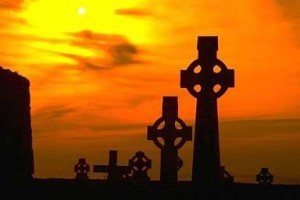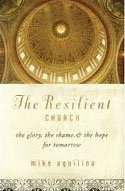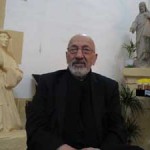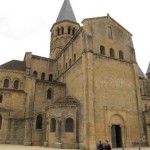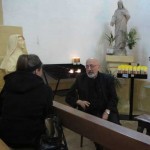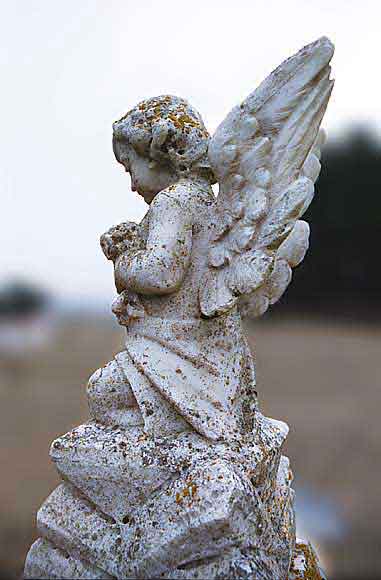 “The holy souls are eager for the prayers of the faithful, which can gain indulgences for them. Their intercession is powerful. Pray unceasingly. We must empty purgatory!”
“The holy souls are eager for the prayers of the faithful, which can gain indulgences for them. Their intercession is powerful. Pray unceasingly. We must empty purgatory!”
– St. Padre Pio
[powerpress ]
Wednesday
O Lord God almighty, I beseech Thee,
by the precious blood
of Thy Divine Son Jesus that was shed
in the streets of Jerusalem
while He carried on His sacred shoulders,
the heavy burden of the cross
deliver the souls in purgatory,
and especially that one which is the richest in merits in thy sight;
so that having soon obtained the high place in glory to  which it is destined,
it may praise Thee triumphantly and bless Thee forever.
Amen.
O Lord, hear my prayer
And let my prayer cry come onto thee.
O God
the Creator and Redeemer of all the faithful,
grant unto the souls of thy servants and handmaids
the remission of all their sins
that through our devout supplications
they may obtain the pardon they have always desired.
Who  live and reign world without end…Amen.
Say the following prayers:
Our Father
Hail Mary
Glory Be
Eternal rest grant unto them, O Lord; and let perpetual light shine upon them.
May their souls and the souls of all the faithfully departed rest in peace. Â Amen.
Tags: catholic, catholic podcast, catholic prayer, cathollc spirituality
This entry was posted on Thursday, November 3rd, 2011 at 12:30 am
You can follow any responses to this entry through the RSS 2.0 feed.
“The holy souls are eager for the prayers of the faithful, which can gain indulgences for them. 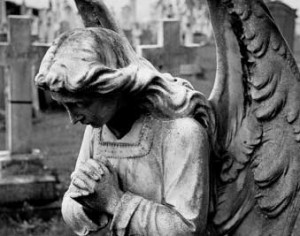 Their intercession is powerful. Pray unceasingly. We must empty purgatory!”
Their intercession is powerful. Pray unceasingly. We must empty purgatory!”
– St. Padre Pio
[powerpress ]
Thursday
O LORD God almighty, I beseech Thee,
by the precious body and blood
of Thy Divine Son Jesus,
which He himself
on the night before His passion
gave as meat and drink to His beloved apostles,
and  He bequeathed His Holy Church
be a perpetual sacrifice and life-giving nourishment
of His  faithful people,
deliver the souls in purgatory,
and but most of all  that soul
which was most devoted to this mystery of infinite love;
in order that it may praise thee, therefore
together with Thy Divine Son,
and  The Holy Spirit,
in Thy glory forever.
Amen.
Tags: catholic, catholic podcast, catholic prayer, cathollc spirituality
This entry was posted on Wednesday, November 2nd, 2011 at 5:57 am
You can follow any responses to this entry through the RSS 2.0 feed.
OK, First…Purgatory, it’s a good thing. While no one knows exactly (though various mystics have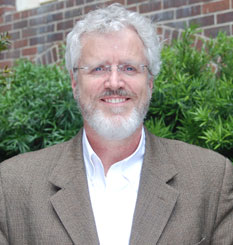 attempted to convey what they experienced by way of their prayer) what will happen there, we do know that if we end up in Purgatory we should be extremely happy since we are most definitely headed for heaven. No one in Purgatory is sent to hell (Yeah!).
attempted to convey what they experienced by way of their prayer) what will happen there, we do know that if we end up in Purgatory we should be extremely happy since we are most definitely headed for heaven. No one in Purgatory is sent to hell (Yeah!).
[powerpress]
First Stop in this exploration is to listen to Deacon James Keating of Institute for Priestly Foramtion with one of the best discussions Bruce and I ever had on the Poor Souls and Purgatory.
So what about praying for the Dead and what does the Church say about the Poor Souls?
What is Purgatory?
The Catechism of the Catholic Church defines Purgatory as follows:
1031 The Church gives the name Purgatory to this final purification of the elect, which is entirely different from the punishment of the damned. The Church formulated her doctrine of faith on Purgatory especially at the Councils of Florence and Trent. The tradition of the Church, by reference to certain texts of Scripture, speaks of a cleansing fire: As for certain lesser faults, we must believe that, before the Final Judgment, there is a purifying fire. He who is truth says that whoever utters blasphemy against the Holy Spirit will be pardoned neither in this age nor in the age to come. From this sentence we understand that certain offenses can be forgiven in this age, but certain others in the age to come (St. Gregory the Great, Dial. 4,39:PL 77,396; cf. Mt 12:31)..
.
.A “final purification” , hmm, sounds like suffering to me, The kind of interior suffering where we have to deal with the painful results of sin inflicted on us by others, but we also with the pain we have inflicted on others…and boy does that hurt. But in this “final purification” (it means just that…final) final healing occurs…an eternal, forever and forever amen, type of healing so we can be  “happy with God forever in Heaven” (to paraphrase the Baltimore Catechism).
The gift of this life here and now on earth is that we can enter into that “purification” now, so that when that moment comes (which we call…death), we can go right to the “pearly gates” and to heaven 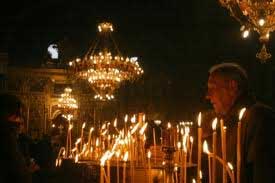 OR we can go to Purgatory to get cleaned up for the beatific vision. St. Teresa of Avila exhorts us to (to paraphrase again) “DO IT NOW, DON’T WAIT”. OK, here are accurate quotes:
OR we can go to Purgatory to get cleaned up for the beatific vision. St. Teresa of Avila exhorts us to (to paraphrase again) “DO IT NOW, DON’T WAIT”. OK, here are accurate quotes:
FROM HOLY SCRIPTURE
There are clear references to Purgatory in both the the Old and the New Testaments. In the Old Testament in 2 Machabees X11 43,46 the Jewish practice of praying for the dead is clearly set out it the following words – ‘It is therefore a holy and wholesome thought to pray for the dead that they may he loosed from their sins.
In the New Testament Our Blessed Lord in Matthew V 26 refers to the prison from which no one is released before his debts are repaid to the last farthing. St. Paul in Cor. 1,3 15 mentions that there are souls who can only be saved ‘yet so as by fire’. It is also stated in Apocalypse XXI, 27 in reference to heaven – ‘There shall in no way enter into it anything defiled”. St. Augustine says that these words clearly indicate that there must be forgiveness of some sins in the world to come, which cannot be in heaven as nothing defiled shall enter therein. Therefore Our Blessed Lord is clearly referring to a place which is neither heaven nor hell and which we call Purgatory.
The learned Protestant, Dr. Jeremy Taylor, writes thus about this matter. ‘We find by the history of the Machabees, that the Jews did pray and make offerings for the dead which appears by other testimonies, and by their form of prayer, still extant, which they used in the captivity. Now it is very considerable that since Our Blessed Saviour did reprove all the evil doctrines of the Scribes and Pharisees, and did argue concerning the dead and the resurrection, yet he spoke no word against this 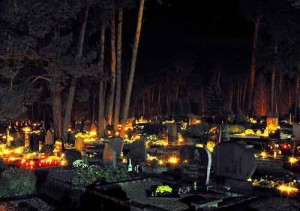 public practice but left it as he found it which he who came to declare to us all the will of His Father, would not have done, if it had not been innocent, pious and full of charity. The practice of it was at first, and was universal; it being plain in TertulIian and St. Cyprian.”
public practice but left it as he found it which he who came to declare to us all the will of His Father, would not have done, if it had not been innocent, pious and full of charity. The practice of it was at first, and was universal; it being plain in TertulIian and St. Cyprian.”
FROM THE FATHERS OF THE CHURCH
“We pray for all among us who are departed believing that this will be the greatest relief for them while the holy and tremendous victim lies present ” – St. Cyril Of Jerusalem
“We make yearly offerings for the dead” – Tertullian
“….. by long punishment for sin to be cleansed a long time by fire and to have purges away all sin by suffering” – St. Cyprian.
‘That you purify me in this life and render me such that 1 may not stand in need of that purging fire” – St. Augustine.
‘No day shall pass you over in silence, no prayer of mine shall ever be closed without remembering you. No night shall pass you over without some vows of my supplications. You shall have share in all my sacrifices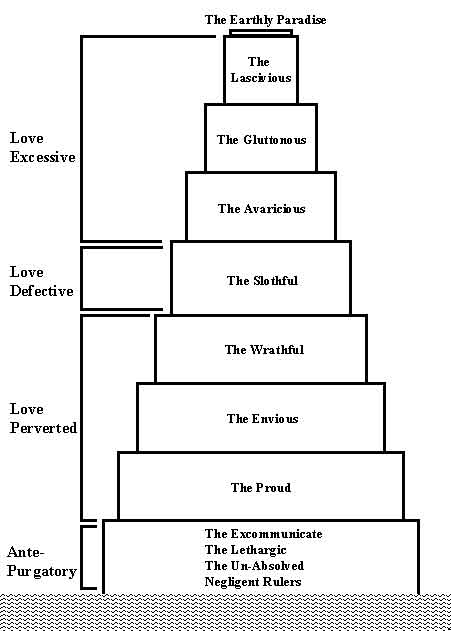 . If I forget you (now that you are dead) let my own right hand be forgotten” – St. Ambrose.
. If I forget you (now that you are dead) let my own right hand be forgotten” – St. Ambrose.
St. Chrysostom in his eighth homily on the Phillipians says that to pray for the faithful departed in the Mass was decreed by the Apostles themselves.
St. Clement of Alexandria says that by punishment after death men must expiate every least sin before they can enter heaven.
Origen in many places and Lactantius teach at large that all souls are purged by the punishment of fire before they enter heaven unless they are so pure as not to stand in need of it.
St. Epiphanius, St. Ephrem, St. Athanasius, Eusebius, St. Paulinus all teach the same.
FROM THE GREAT SAINTS
“No tongue can express, no mind can understand, how dreadful is Purgatory…And be assured that the souls have to pay what they owe even to the last farthing. This is God’s decree to satisfy the demands of justice” –St. Catherine of Genoa.
“Purgatory fire will be more intolerable than all the torments that can be felt or conceived in this life” – Venerable Bede.
“A person may say, I am not much concerned how long I remain in Purgatory, provided I may come to eternal life. Let no one reason thus. Purgatory fire will more dreadful than whatever torment can be seen, imagined or endured in this world.” – St. Caesarius of Arles.
‘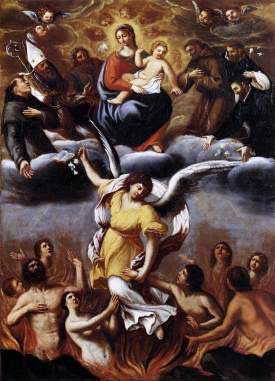 The same fire torments the damned in hell and the just in Purgatory. The least pain in Purgatory exceeds the greatest in this life.” – St. Thomas Aquinas.
The same fire torments the damned in hell and the just in Purgatory. The least pain in Purgatory exceeds the greatest in this life.” – St. Thomas Aquinas.
“My God, what soul would be sufficiently just to enter heaven without passing through the avenging flames’ – St. Teresa of Avila.
‘If we were thoroughly convinced of the torments of Purgatory, could we then so easily forget our parents……. if God would permit them to show themselves we would we would see them cast themselves down at our feet “My children”, they would cry out, “have mercy on us! Oh, do not forsake us!’. – St. John Vianney.
FROM PRIVATE REVELATION
“When I was praying before the Blessed Sacrament on the Feast of Corpus Christi a person enveloped in fire suddenly stood before me. From the pitiable state the soul was in I knew it was in Purgatory and I wept bitterly” – St. Margaret Mary Alacoque.
At FATIMA in 1917 Our Blessed Lady appeared to three children – Lucy, Jacinta and Francesco. The series of appearances by Our Lady to these three children is approved by the Church. Shortly before they took place a young girl from the village had died. She was about fourteen years old. The children asked Our Blessed Mother whether or not she had been saved. The Blessed Virgin advised them that indeed she had been saved but that she would be in Purgatory until the end of the world. (As a result of this revelation many prayers were offered up for her soul and we can only pray that because of this her souls has now been released into eternal glory). From this most authoritative account we can learn three things:
(i) the reality of Purgatory
(ii) great length of time many souls have to stay there
(iii) the tremendous importance of praying for the souls of the departed
Here's some more places you can go if you are still having trouble....
![]() The Burning Truth about Purgatory
The Burning Truth about Purgatory
![]() How to Explain Purgatory to Protestants (James Akin)
How to Explain Purgatory to Protestants (James Akin)
![]() The Roots of Purgatory
The Roots of Purgatory
![]() Purgatory
Purgatory
Tags: baltimore catechism, catechism of the catholic church, catholic, catholic podcast, catholic prayer, cathollc spirituality, Church, Deacon James Keating, doctrine of faith, First Stop, heaven, mystics, poor souls, prayer, purgatory
This entry was posted on Wednesday, November 2nd, 2011 at 12:45 am
You can follow any responses to this entry through the RSS 2.0 feed.
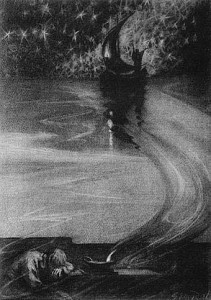 Blessed John Newman’s poem “The Dream of Gerontius” tells the story of a soul’s journey through death, and provides a meditation on the unseen world of Roman Catholic theology.
Blessed John Newman’s poem “The Dream of Gerontius” tells the story of a soul’s journey through death, and provides a meditation on the unseen world of Roman Catholic theology. 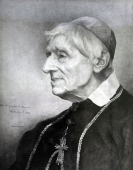
Click here for the full text of the poem
Gerontius (a name derived from the Greek word geron, “old man”) is a devout Everyman.Elgar’s setting uses most of the text of the first part of the poem, which takes place on Earth, but omits many of the more meditative sections of the much longer, otherworldly second part, tightening the narrative flow.
In the first part, we hear Gerontius as a dying man of faith, by turns fearful and hopeful, but always confident. A group of friends (also called “assistants” in the text) joins him in prayer and meditation. He passes in peace, and a priest, with the assistants, sends him on his way with a valediction. In the second part, Gerontius, now referred to as “The Soul”, awakes in a place apparently without space or time, and becomes aware of the presence of his guardian angel, who expresses joy at the culmination of her task (Newman conceived the Angel as male, but Elgar gives the part to a female singer). After a long dialogue, they journey towards the judgment throne.
They safely pass a group of demons, and encounter choirs of angels, eternally praising God for His grace and forgiveness. The Angel of the Agony pleads with Jesus to spare the souls of the faithful. Finally Gerontius glimpses God and is judged in a single moment. The Guardian Angel lowers Gerontius into the soothing lake of Purgatory, with a final benediction and promise of a re-awakening to glory. –wiki
Here is mezzo-soprano Sarah Connelly as the angel offering a beautiful version of “Softly and Gently” (which is the last passage of Edward Elgar’s musical oration of the “Dream of Gerontius”) as he is peacefully being placed into the lake of Purgatory. A stunning work and meditation for this or any day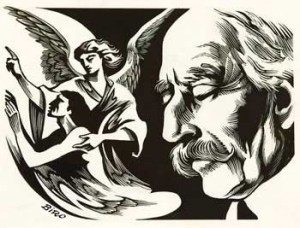
.
SOFTLY and gently, dearly-ransomed soul,
In my most loving arms I now enfold thee,
And, o’er the penal waters, as they roll
I poise thee, and I lower thee, and hold thee.
And carefully I dip thee in the lake,
And thou, without a sob or a resistance,
Dost through the flood thy rapid passage take,
Sinking deep, deeper, into the dim distance.
Angels, to whom the willing task is given,
Shall tend, and nurse, and lull thee, as thou liest;
And Masses on the earth and prayers in heaven,
Shall aid thee at the Throne of the most Highest
Farewell, but not forever! Brother dear,
Be brave and patient on thy bed of sorrow;
Swiftly shall pass thy night of trial here,
And I will come and wake thee on the morrow.
.
Tags: catholic, catholic podcast, catholic prayer, cathollc spirituality, choirs of angels, dream of gerontius, edward elgar, grace and forgiveness, john newman, roman catholic theology
This entry was posted on Wednesday, November 2nd, 2011 at 12:02 am
You can follow any responses to this entry through the RSS 2.0 feed.
During his Angelus on Tuesday, Pope Benedict said “the Feast of All Saints is a good time to lift our gaze from the realities of the world… to the enormity of God, who encompasses all eternity and holiness. “
He said holiness is the vocation of all the baptized, and all the people of God are called to be saints.
The Pope then turned his thoughts to Wednesday’s commemoration of All Souls
[powerpress = “Vatican Radio”]
“From the early days of the Christian faith,†he said, “the Church on earth, recognizing the communion of the whole mystical body of Jesus Christ, has with great respect honored the memory of the dead and offered prayers for them.â€The Pope said “our prayers for the dead are not only useful, but necessary.â€
The Holy Father reminded the faithful to keep the bonds of affection with our loved ones who have died, not only through prayer, but also through actions like visiting cemeteries.
He said this reminds us all that we are meant for another life after death.
see more on the website for Vatican Radio
Tags: all saints, catholic, catholic podcast, catholic prayer, cathollc spirituality, pope benedict xvi, prayer, purgatory, vatican radio
This entry was posted on Tuesday, November 1st, 2011 at 2:42 pm
You can follow any responses to this entry through the RSS 2.0 feed.
November 2011 [powerpress = devotionals-prayers]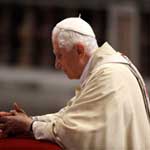
General Intention:Â For the eastern Churches, that their venerable tradition may be known and appreciated as a spiritual treasure for the entire Church.
Missionary Intention:Â That the African continent may find in Christ the strength to fulfill the path of reconciliation and justice, indicated in the second Synod of Bishops for Africa.
Tags: catholic, catholic podcast, catholic prayer, cathollc spirituality, holy father's intentions, powerpress, venerable tradition
This entry was posted on Tuesday, November 1st, 2011 at 2:19 pm
You can follow any responses to this entry through the RSS 2.0 feed.
Matthew and Margaret Bunson did an incredible job of chronicling all those holy men and women who were brought 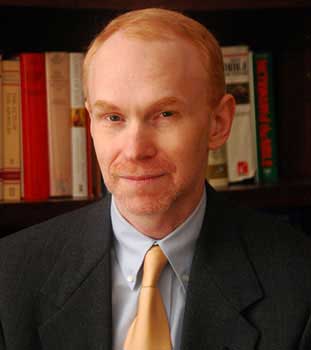 forward by our late great Holy Father, Pope John Paul II. The only thing that even comes close to reading this great book is hearing Dr. Matthew Bunson talk about those tremendous Blesseds and Saints. “John Paul II’s Book of Saints” is truly a treasury of sanctity!
forward by our late great Holy Father, Pope John Paul II. The only thing that even comes close to reading this great book is hearing Dr. Matthew Bunson talk about those tremendous Blesseds and Saints. “John Paul II’s Book of Saints” is truly a treasury of sanctity!
[powerpress]
He was known as the saint-making Pope, and he reinvigorated the world’s devotion to saints. John Paul II, himself a candidate for sainthood, left a treasury of ideals and hope for the future in these “examples of courage and coherence.” He offered us these real lives lived in extraordinary ways as ones to identify with, aspire to, and ask for intercession.
Tags: catholic, catholic podcast, catholic prayer, cathollc spirituality
This entry was posted on Tuesday, November 1st, 2011 at 10:22 am
You can follow any responses to this entry through the RSS 2.0 feed.
“The holy souls are eager for the prayers of the faithful, which can gain indulgences for them. Their intercession is powerful. Pray unceasingly. We must empty purgatory!”
– St. Padre Pio
[powerpress ]
Friday
O LORD God almighty, I beseech Thee,
by the precious blood
which Thy Divine Son, Jesus, did shed on this day,
upon the tree of the cross,
especially from His sacred hands and feet,
deliver the souls in purgatory,
and particularly that soul for whom I am most bound to pray;
in order that I may not be the cause which hinders Thee
from admitting it quickly into the possession of Thy glory
where it may praise and bless Thee forever more.
Amen.
Tags: catholic, catholic podcast, catholic prayer, cathollc spirituality
This entry was posted on Tuesday, November 1st, 2011 at 5:10 am
You can follow any responses to this entry through the RSS 2.0 feed.
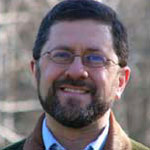 Episode 8– The Conversion of the New World
Episode 8– The Conversion of the New World
The Resilient Church with Mike Aquilina, offers a fascinating look at the trials and triumphs of the Catholic Church over the past two thousand years. Fast-paced sketches of critical periods in church history give readers perspective on the challenges faced by the church today. Mike Aquilina does not shrink from the realities of the past, including badly behaved leaders and those who betrayed the Lord. Yet he also leaves us all with well-founded hope for the future: God remains faithful in every circumstance and fulfills his promise to remain with his church always. Hosted by Kris McGregor
Also visit Mike’s “Discerning Hearts†page for more audio downloads and information!
Tags: catholic, catholic church, catholic podcast, catholic prayer, cathollc spirituality, church history, mike aquilina, Resilient Church, st. paul center for biblical theo
This entry was posted on Monday, October 31st, 2011 at 4:01 pm
You can follow any responses to this entry through the RSS 2.0 feed.
Show 8 – The Truth About Contraception part 2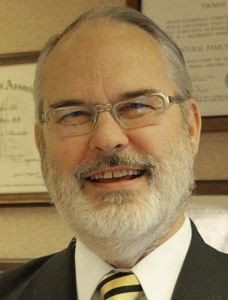
“Your Fertility Care Consultâ€
with Dr. Thomas Hilgers, founder of the Pope Paul VI Institute
for The Study of Human Reproduction
hosted by Kris McGregor
[powerpress]
listen to the entire series at Dr. Hilger’s Discerning Hearts Page
The Pope Paul VI Institute, founded in 1985 by Thomas W. Hilgers, MD, is internationally recognized for its outstanding achievements in the field of natural fertility regulation and reproductive medicine — 30 years of scientific research and educational program development; allied health professional education programs for couples and professionals; professional, caring, and morally acceptable patient services. The Pope Paul VI Institute for the Study of Human Reproduction is building a culture of life in women’s health care through its major developments — Creighton Model FertilityCare System and NaProTechnology.
Tags: catholic, catholic podcast, catholic prayer, cathollc spirituality, Contraception, human reproduction, pope paul vi institute, thomas hilgers, Thomas W. Hilgers
This entry was posted on Monday, October 31st, 2011 at 11:14 am
You can follow any responses to this entry through the RSS 2.0 feed.
From Paray le Monial, France, I had the chance to catch up with Msgr. John Esseff at the First Sacred Heart World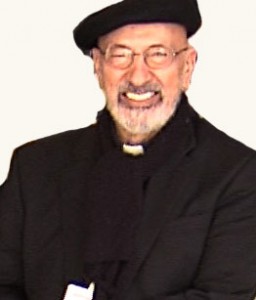 Congress.  Msgr. Esseff is one of the founders of the Sacred Heart Apostolate, sponsor of this event which brought laity, religious, and priests from around the world.  Talks where given by Cardinal Raymond Burke, Bishop Robert Herman, Christendom College President Timothy O’Donnell, and EWTN show host and author Fr. Mitch Pacwa, as well as many others  Why did they come to this small French community nestled in Eastern France?  Because our Lord choice this place and two very remarkably humble saints to communicate the message of his Sacred Heart.  He said to St. Margaret Mary:
Congress.  Msgr. Esseff is one of the founders of the Sacred Heart Apostolate, sponsor of this event which brought laity, religious, and priests from around the world.  Talks where given by Cardinal Raymond Burke, Bishop Robert Herman, Christendom College President Timothy O’Donnell, and EWTN show host and author Fr. Mitch Pacwa, as well as many others  Why did they come to this small French community nestled in Eastern France?  Because our Lord choice this place and two very remarkably humble saints to communicate the message of his Sacred Heart.  He said to St. Margaret Mary:
[powerpress]
 “My divine Heart is so inflamed with love for mankind … that it can no longer contain within itself the flames of its burning charity and must spread them abroad by your means.” She described that His Heart was on fire and surrounded by a crown of thorns. Our Lord told her that the flames
represented His love for humanity, and the thorns represented man’s sinfulness and ingratitude. Jesus informed her that her mission was to establish the devotion to His Most Sacred Heart, and He revealed twelve promises that He would bestow upon all those who practice the devotion.
She had three more visions over the next year and a half in which Jesus instructed her in a devotion that was to become known as the Nine Fridays. Christ also inspired Margaret Mary to establish the Holy Hour and to receive Holy Communion on the first Friday of every month. In the final revelation, the Lord asked that a feast of reparation be instituted for the Friday after the octave of Corpus Christi.
Blessed Claude de la Colombiere, a holy and experienced Jesuit, arrived as confessor to the nuns, and in him Margaret Mary recognized the understanding guide that had been promised to her in the visions. He became convinced that her experiences were genuine and adopted the teaching of the Sacred Heart that the visions had communicated to her.
Msgr. Esseff talks about that message, what it means for us today, and how we can live it out.
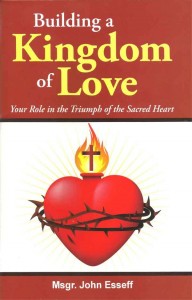 Â Visit Msgr. Esseff’s website here
 Visit Msgr. Esseff’s website here
Tags: catholic, catholic podcast, catholic prayer, cathollc spirituality, msgr. john esseff, sacred heart, sacred heart apostolate, sacred heart of jesus
This entry was posted on Monday, October 31st, 2011 at 8:54 am
You can follow any responses to this entry through the RSS 2.0 feed.
“The holy souls are eager for the prayers of the faithful, which can gain indulgences for them. Their intercession is powerful. Pray unceasingly. We must empty purgatory!”
– St. Padre Pio
[powerpress]
Saturday
O Lord God almighty, I beseech Thee,
by the precious blood
which gushed forth from the sacred side
of Thy Divine Son Jesus
in the presence of and and to the great sorrow
of His most holy Mother
deliver the souls in purgatory,
and among them all especially that soul
which has been most devout to this noble Lady;
that it may come quickly into Thy glory,
there to praise Thee in her,
and her in Thee,
through all the ages.
Amen.
Tags: catholic, catholic podcast, catholic prayer, cathollc spirituality
This entry was posted on Monday, October 31st, 2011 at 6:45 am
You can follow any responses to this entry through the RSS 2.0 feed.
Episode 8 – Seeking Truth with Sharon Doran, hosted by Bruce McGregor.  Ep 8- “The Samaritan Woman at the Well”, John Chapter 4
[powerpress]

Sharon Doran serves as the teaching director of “Seeking Truth.†An experienced Bible Study teacher, Sharon has a passion forscripture that will motivate and challenge you to immerse yourself in God’s Word and apply His message to your every day life.
 Episode 8 – John Chapter 4 Sharon and Bruce discuss the importance of the Samarian area, Jacob’s well, the animosity between the Samaritans and the Jews, and the gender bias against women.
Episode 8 – John Chapter 4 Sharon and Bruce discuss the importance of the Samarian area, Jacob’s well, the animosity between the Samaritans and the Jews, and the gender bias against women.
 “Seeking Truth†is an in depth Catholic Bible Study, commissioned by the Archdiocese of Omaha in response to John Paul II’s call to the New Evangelization as well as Pope Benedict XVI’s exhortation for all Catholics to study scripture. To learn more go to: www.seekingtruth.net
“Seeking Truth†is an in depth Catholic Bible Study, commissioned by the Archdiocese of Omaha in response to John Paul II’s call to the New Evangelization as well as Pope Benedict XVI’s exhortation for all Catholics to study scripture. To learn more go to: www.seekingtruth.net
Tags: catholic, catholic podcast, catholic prayer, cathollc spirituality, gospel of john, John Chapter, seeking truth, Sharon Doran
This entry was posted on Friday, October 28th, 2011 at 11:38 am
You can follow any responses to this entry through the RSS 2.0 feed.
Episode 9 – Great Works in Western Literature with Joseph Pearce – Nathaniel Hawthorne
[powerpress]
A key figure in the development of American literature, Nathaniel Hawthorne was 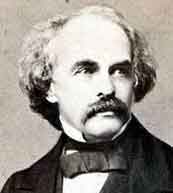 also profoundly influenced by his ancestors and the Christianity that underscored their Puritan heritage. A literary classic, The Scarlet Letter presents a profound meditation on the nature of sin, repentance, and redemption, and on how such Christian concepts may be integrated into American democracy.
also profoundly influenced by his ancestors and the Christianity that underscored their Puritan heritage. A literary classic, The Scarlet Letter presents a profound meditation on the nature of sin, repentance, and redemption, and on how such Christian concepts may be integrated into American democracy.
 Based on the Ignatius Critical Edition, this series examines, from the Judeo-Christian perspective, the life, the times, and influence of authors of great works in literature .
Based on the Ignatius Critical Edition, this series examines, from the Judeo-Christian perspective, the life, the times, and influence of authors of great works in literature .
Joseph Pearce is currently the Writer-in-Residence and Visiting Fellow at Thomas More College of Liberal Arts in Merrimack, New Hampshire. He is also Visiting Scholar at Mount Royal Academy in Sunapee, New Hampshire. He is also Visiting Scholar at Mount Royal Academy in Sunapee, New Hampshire. He is  co-editor of the Saint Austin Review (or StAR), an international review of Christian culture, literature, and ideas published in England (Family Publications) and the United States (Sapientia Press). He is also the author of many books, including literary biographies of Solzhenitsyn, J. R. R. Tolkien, C. S. Lewis, G. K. Chesterton, and Oscar Wilde.
To learn more about the authors and titles available in the Ignatius Critical Editions
Tags: american literature, ave maria university, catholic, catholic podcast, catholic prayer, cathollc spirituality, ignatius press critical editions, joseph pearce, literary biographies, meditation, nathaniel hawthorne, reconciliation, sapientia press, scarlet letter, sin
This entry was posted on Friday, October 28th, 2011 at 7:56 am
You can follow any responses to this entry through the RSS 2.0 feed.
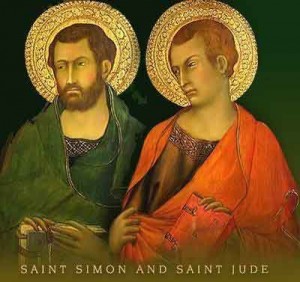 Why is this feast day of the two apostles celebrated together…Simon the Zealot and Jude, patron of the impossible? Through Jesus, with Jesus, in Jesus, all things are possible!
Why is this feast day of the two apostles celebrated together…Simon the Zealot and Jude, patron of the impossible? Through Jesus, with Jesus, in Jesus, all things are possible!
Tags: catholic, catholic podcast, catholic prayer, cathollc spirituality, Jesus, st. jude
This entry was posted on Friday, October 28th, 2011 at 7:16 am
You can follow any responses to this entry through the RSS 2.0 feed.

